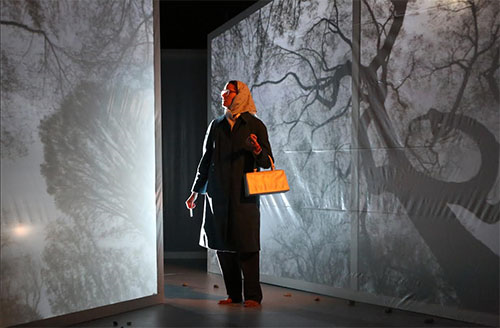By Eric Grode
“I really had to decide as a playwright what I believe happened in that car.”
Catherine Filloux is describing an actual 1963 Oldsmobile that drove down an actual Alabama road 49 years ago. And many things that happened in that car is preserved in FBI records, which Filloux read while writing her new one-woman show, Selma ’65.
But for reasons that become clear as the play unfolds, the exact details of March 25, 1965 remain murky. Selma ’65 marks Filloux’s latest attempt, following previous works about genocides in Cambodia and Bosnia, to take the more shameful pages of the history books and fill them with names and faces and recognizable actions.
Or as she puts it, “I’ve always been interested in bringing people who have been lost in history back into the light.” Even when the shadows persist despite everything.
Selma ’65 plays through October 12 at La MaMa before touring the country to commemorate the coming 50th anniversary of the Civil Rights marches from Selma to Montgomery. It features the actress Marietta Hedges in two very different roles. She plays both Viola Liuzzo, a Detroit housewife who impulsively signed on to assist with the marches, and Tommy Rose, an FBI informant who was entrusted with spying on the Ku Klux Klan in Alabama. Hedges commissioned Filloux to write the play, which toggles between the two characters until they meet on Route 80.
Information about Viola and Tommy emerges slowly in the play, with very little provided in the way of identification or explanation. Filloux, who has been an artist in residence at La MaMa since 2011, made a point of learning as much as possible about them but then leaving out as much of that background as she could. “You don’t want the audience to be mystified,” she says, “but at the same time, playwrights hate exposition.”
It is Filloux’s fidelity to the truth, combined with a willingness to stretch the viewer, that has impressed La MaMa managing director Mary Fulham. “There are no flights of fancy,” Fulham says of her plays, which have included Lemkin’s House and Dog and Wolf. “She is very true to the events.”
Along the way, we do learn that Viola and Tommy “both have flaws and both have commonalities,” Filloux says. Neither of them ever finished high school, for one thing. One aspect of Viola’s life that Filloux does not view as a flaw, however, is the fact that she had a husband and five kids back in Detroit. This last fact was cited frequently to disparage Viola, says Filloux, who questions whether similar attention would have been paid to a man who did the same.
“Catherine’s not dealing with stereotypical heroes and villains, which is why these stories stay with you,” Fulham says. “She doesn’t tell the story the way you want it to be told.”
—
Eric Grode is a freelance arts writer and a professor at Syracuse University’s Goldring Arts Journalism Program
Photo by Steven Schreiber
